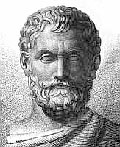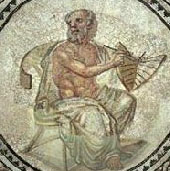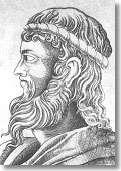![]()
![]()
Ancient Philosophy
The Presocratics – The Milesian Monists
Primary Sources:
- Thales, Anaximander, and Anaximenes, Fragments from Baird and Kaufmann, Ancient Philosophy, pp. 6-10.
- Thales Anaximander, and Anaximenes, Additional Fragments (Handout).
Secondary Source:
- Irwin, “The Naturalist Outlook”, “Nature as Matter”, and “Conceptions of Nature” from Classical Thought, pp. 20-23.
Background:
From Richard McKirahan’s Routlegde Online Encyclopedia article on Thales:
Known as the first Greek philosopher, Thales initiated a way of understanding the world that was based on reason and nature rather than tradition and mythology. He held that water is in some sense the basic material, that all things are full of gods and (purportedly) that all things possess soul. He predicted an eclipse of the sun and was considered the founder of Greek astronomy and mathematics.
The first Presocratic philosopher and reputed founder of Western philosophy and science, Thales lived in the early sixth century BC in Miletus, a prosperous Ionian Greek city on the seaboard of Asia Minor. At Miletus he was followed in turn by Anaximander and Anaximenes, the other members of the so-called Milesian School. These two refined his rational approach to the study of nature and extended its application, leaving an intellectual legacy that was decisive for later Presocratic philosophers and, through them, for Plato, Aristotle and the Hellenistic philosophical schools, and consequently for the rest of the Western cultural tradition.
It is doubtful whether Thales wrote anything. Although ancient sources ascribe several works to him, no writing of his was available to Aristotle. Our knowledge depends entirely on the reports of others, many of which are inaccurate and even fanciful, thanks to the legendary status Thales achieved. Thales was the only Presocratic philosopher numbered among the Seven Sages, and this honor is probably due to his reputation for practical advice rather than for his scientific and philosophical work. He is said to have told the Ionian cities to form a political union with a common, centrally located governing council, the better to resist Persian aggression and to have advised the Lydian king Croesus how to ford the Halys River. He was most famous for predicting a solar eclipse that took place on 28 May 585 BC.
From Richard McKirahan’s Routlegde Online Encyclopedia article on Anaximander:
The Greek philosopher Anaximander of Miletus followed Thales in his philosophical and scientific interests. He wrote a book, of which one fragment survives, and is the first Presocratic philosopher about whom we have enough information to reconstruct his theories in any detail. He was principally concerned with the origin, structure and workings of the world, and attempted to account for them consistently, through a small number of principles and mechanisms. Like other thinkers of his tradition, he gave the Olympian gods no role in creating the world or controlling events. Instead, he held that the world originated from a vast, eternal, moving material of no definite nature, which he called apeiron (’boundless’ or ‘unlimited’). From this, through obscure processes including one called ’separation off’, arose the world as we know it. Anaximander described the kosmos (world) and stated the distances of the celestial bodies from the earth. He accounted for the origin of animal life and explained how humans first emerged. He pictured the world as a battleground in which opposite natures, such as hot and cold, constantly encroach upon one another, and described this process as taking place with order and regularity.
Very little is known of Anaximander’s life. His dates (c.610 BC–shortly after 546 BC) are not certain, but make him a generation younger than Thales, whose pupil, successor and associate he is variously called. Like Thales he was a Milesian. He is said to have traveled to Sparta, where he predicted an earthquake and set up a gnomon (a Babylonian invention for marking the length of the sun’s shadow, which he is credited with discovering) on the sundials there to mark solstices, equinoxes and the hours of the day. He is also said to have led a Milesian colony to Apollonia on the Black Sea and, it is reported, made the first map and the first ‘sphere’ or celestial globe. He wrote at least one work, known as On Nature (the title the Alexandrian scholars later gave to the works of most of the Presocratics; it is not Anaximander’s title) in which he presented his views on the kosmos.
As with other reported discoveries of the Presocratics, this evidence demands cautious treatment. The map is possible, although it will have been extremely crude and founded more on principles of symmetry than on measurement. And, since Anaximander had views about the size and shape of the kosmos, he may have constructed a model of it. If he foretold an earthquake however, it was just a lucky guess. Alternatively, later authors could have invented the prediction to give Anaximander something comparable to Thales’ prediction of an eclipse. The report about the gnomon is usually accepted as likely, as it agrees with Anaximander’s undoubted interest in astronomy.
From Richard McKirahan’s Routlegde Online Encyclopedia article on Anaximenes:
The Greek philosopher Anaximenes of Miletus followed Anaximander in his philosophical and scientific interests. Only a few words survive from his book, but there is enough other information to give us a picture of his most important theories. Like the other early Presocratic philosophers he was interested in the origin, structure and composition of the universe, as well as the principles on which it operates. Anaximenes held that the primary substance – both the source of everything else and the material out of which it is made – is air. When rarefied and condensed it becomes other materials, such as fire, water and earth. The primordial air is infinite in extent and without beginning or end. It is in motion and divine. Air generated the universe through its motion, and continues to govern it. The human soul is composed of air and it is likely that Anaximenes believed the entire kosmos (world) to be alive, with air functioning as its soul. Like other Presocratics, he proposed theories of the nature of the heavenly bodies and their motions, and of meteorological and other natural phenomena.
Questions:
- According to Irwin, why does Aristotle identify the Pre-Socratics as the first phusiologoi [naturalists] and how were they different from the earlier muthologoi [mythologists]? What does it mean to be a naturalist according to Aristotle?
- What major accomplishments is Thales attributed with?
- What does Thales identify as the hupokeimenon [basic subject, basic matter, or original source] and archê [first principle or origin] of all things? Why might he believe this (consider where he lived, etc…)?
- How does Thales account of earthquakes epitomize naturalist (as opposed to mythological) thinking?
- Why does Thales believe “all things are full of gods”?
- What major accomplishments is Anaximander attributed with?
- What does Anaximander identify as the hupokeimenon and archê of all things? How is this an advance from Thales? What problem with this account does Irwin identify?
- Why might some consider Anaximander a proto-Darwinian?
- What does Anaximenes identify as the hupokeimenon and archê of all things? How does Anaximenes’ account attempt to resolve Irwin’s criticism of Anaximander?
I love Apache! So should you!
![]()





